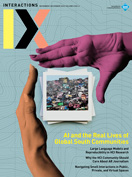Authors:
Mikael Wiberg, Elizabeth F. Churchill
Greetings, Interactions readers! Welcome to the last issue of the magazine for 2024. It's hard to believe the year has already come to an end.
As we wrap up 2024 and focus on New Year's Eve, our resolutions for 2025, and what comes next, we should also reflect on where we have been and where we are right now. During the past year, we have continued to see a fast-paced development of generative AI. Many studies have been conducted on the use and deployment of this technology in different social contexts. We've followed reports on how this technology reconfigures the nature of work and how we communicate. We've also paid more attention to the environmental footprint of generative AI—something no technology can avoid. But while that, as well as some technology pioneers' ability to master this new computational (super)power, is known, less has been said about what it means for the Global South. In short, where do we stand with AI on the global level?
In this issue, Matt Jones and his coauthors center this perspective in our cover story, "Beyond 'Slumming It'—AI and the Real Lives of Global South Communities." Another AI-focused feature article, Thomas Kosch and Sebastian Feger's "Risk or Chance? Large Language Models and Reproducibility in Human-Computer Interaction Research," examines the rapid adoption of large language models in research and the subsequent problems, among them reproducibility and bias. And we shouldn't forget other amazing technologies that enable, scaffold, and reconfigure professions. Victoria McArthur walks us through one such discussion in "Why the HCI Community Should Care About AR Journalism." It's an example of a relatively new technology that enables journalists to advance their storytelling capabilities and foster deeper connections with audiences across the world—a process in which the HCI community can lend its expertise. Augmented reality enables us to see new or existing things differently, but seeing is just one of the five senses—we can also hear, taste, smell, and touch. New forms of computing will challenge, change, and add capabilities to these basic human senses. In "Scent and Space: Navigating Smell Interactions in Public, Private, and Virtual Spaces" Anna Carter and her coauthors provides us with such examples.
We should not, however, think only about our own senses and capabilities and be solely human-centered. We need to consider more-than-human values and perspectives too as we move forward and design the next generation of interactive systems. While generative AI has dominated our discussions in 2024, there is growing interest in seeing beyond these technologies and in sustainability. Columnist Melissa Gregg guides us through a number of issues in designing green UX. The message here is clear and simple: We cannot focus solely on user experiences and disregard sustainability and our environmental footprint.
Accordingly, the overarching theme for this issue is "global, green, and generative design"—an umbrella term for thinking about global perspectives, sustainability issues, and ways of integrating AI into interactive system design. That paradigm comes with the responsibility to consider more than just those who are already privileged in the design of new technologies; we also need to take into account how these new technologies serve human needs, their environmental footprint, and how AI can be aligned with human-computer interaction rather than be a substitute for it. As we exit 2024 and look to the future, we can take these current trends with us in the form of responsibilities for moving ahead. For HCI, this means not only investigating forward-looking approaches but also developing reflective and responsible design and deploying new interactive technologies. To paraphrase a popular saying, with great technologies come great responsibilities.
Wishing you all the best for the end of 2024, and hoping that whatever you celebrate in this season brings you and yours joy.
Mikael Wiberg and Elizabeth F. Churchill
[email protected]
Copyright held by owners/authors
The Digital Library is published by the Association for Computing Machinery. Copyright © 2024 ACM, Inc.








Post Comment
No Comments Found